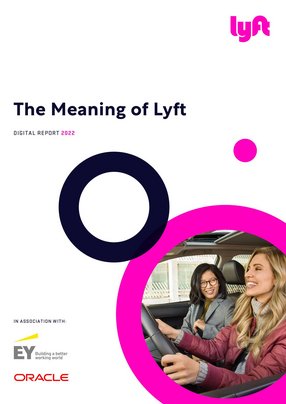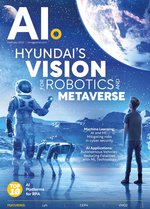No digital enterprise is an island entire of itself. They need strong well-suited partnerships, realistic but ambitious targets and some creative ‘beyond the box thinking.’
That’s how Zach Greenberger approaches his pivotal role at Lyft. Greenberger is a supply chain guy. He knows it link by link. He hails from an impressive background. IBM and Tesla. He’s been with Lyft for three years.
‘My focus is delivering value to the end-to-end supply chain for our broader business and then fostering partnerships that drive incrementality and loyalty to our customer base,’ he says. In other words: growing a business step-by-step and ensuring you don’t lose your loyal customers along the way.
To do that Greenberger says he needs working relationships with suppliers who become long term partners, with similar goals and a matching culture.
‘ I’ve always been one who believes mature supply chain organizations play a critical role, not only driving efficiencies to the business through a world class supply base but also becoming trusted advisors, operators and problem solvers for our stakeholders.
‘Most people know Lyft as a rideshare company. But, we are focused on improving people's lives with the world's best transportation,’ says Greenberger.
Sounds good? But what does that mean?
‘We are developing and innovating products that address the end-to-end value chain of all of our customers' transportation needs. From our core rideshare business to micro mobility, we offer everything from on-demand vehicles, bikes and scooter solutions, and even vehicle servicing and rentals. Ultimately, our goal is to create products that effectively eliminate the barriers of transportation and make them accessible and enjoyable in anybody's day-to-day life. .’
This may sound like a well-rehearsed mission statement. But behind these words is a culture where providing the best services is deeply engrained.
‘At its core we need a supply chain that delivers the best experience to our customers and stakeholders, so we are, in fact, able to focus on how we progress against our mission alongside our partners.’
‘This vision really ‘jives’ perfectly with Lyft’s mentality as a broader company. We have an exceptional culture that promotes healthy debate,’ he says.
Greenberger expands on this and what he means when it comes to setting goals: ‘You know, I take significant pride in the trust and reputation that we have built with our internal team members, and to me, that defines the power of our team's ability to deliver against super aggressive targets.’
“Super Aggressive Targets?” That sounds impressive but what does that mean?
Greenberger explains: ‘Data driven decision making and focusing on our core competencies to improve people's lives with the world's best transportation is priority thinking. It’s that mentality which is really a supply chain team’s dream’
Greenberger is driven to ensure his teams at Lyft are undeniably ‘best in class’.
‘They really differentiate themselves from other supply chain teams in the industry,’ he says. ‘Not only does that play out in the results for our supply chain team, but I also see this has unlocked efficiencies and driven velocity for our internal teams to deliver against the company’s core mission to build the best transportation products in the market.’
The upshot of this according to Greenberger is allowing his people to ‘hyper focus’ on customers and make sure they are being delivered the best products day to day.
CONSULTING THE ORACLE
Greenberger says he wants the driving force behind Lyft’s Supply Chain to always be its ability to influence decision making and truly partner with stakeholders to help drive the best results for Lyft. ‘Growing businesses survive and prosper by nurturing the right working culture.’
At this point it is clear Greenberger can’t take this narrative any further until he talks about Oracle. The two businesses hitched a ride together some time ago and the journey has become more comfortable and successful with each passing year.
‘Oracle 'was the foundational solution that was able to solve our end-to-end needs and really give us the tooling that we needed to scale long term.’
So, one of the main things that we've really enjoyed by having a very strategic partnership is the ability to discuss and access solutions that historically haven’t been offered in the market.
‘Oracle is very focused on helping unlock infrastructure efficiencies for Lyft everyday . The partnership overall has been fantastic, and I do believe that a lot of that is because we see so many similarities within our culture.’
Greenberger says Oracle was a fundamental element of Lyft’s ERP (Enterprise Resource Planning) journey.
‘It was critical that we took every step we could to effectively run our business, while also building a foundation that would allow them to scale, and this is precisely where Oracle came in.
‘Implementing Oracle's ERP infrastructure really unlocked access to data that our finance and supply chain teams needed while simultaneously providing team leadership a more holistic view of how we conduct resource planning and execute strategies through our evaluation of the market.’
FOCUS, FOCUS, FOCUS
Zach Greenberger attributes Lyft’s ability to step up a gear… several gears… to the company’s successful IPO just before the pandemic. He also believes Lyft had a head start over its competitors by originating as a digital platform.
``The initial public offering has certainly benefited us,’ he says. ‘I also think that one of our differentiators in the market is that we are hyper focused on our mission. We don't get distracted with other things that aren't directly tied to that mission of improving people's lives with the world's best transportation. Every day, we are ruthlessly prioritizing projects and products that continue to bring us closer to our goals.’
TO INFINITY AND BEYOND
So, that was THEN. We’ve covered NOW… what of the future?
No interview with a leading supply chain ‘guy’ is complete these days without drilling down where they see their business going in the future… especially in the Covid age. So, where does Zach Greenberger expect Lyft to lead the charge in innovtation, particularly in IoT and AI as driving forces?
Greenberger claims Lyft is uniquely placed to take the market into uncharted territory here and can overcome perhaps the biggest obstacle to the expansion of automated transportation: Economics, not technology which will hold the market back.
‘We've seen a ton of progress in the acceleration of autonomy within vehicles, right?’ he says. ‘I think one of the unique things about what Lyft is building is the fleet management capability to be able to maintain and operate autonomous vehicles in a way that most effectively utilizes them, given the daily supply and demand signals in the marketplace.’
``We see that with the vehicles that are operated on the platform today. I mean I think one of the craziest aspects of the entire industry is that, even though the vehicle has the ability to drive itself in certain routes, there is also a lingering question on how the economics will pencil out long term.’
This is where Greenberger thinks Lyft comes into its own. Creating demand is one thing. Turning that demand into a viable business is another. The two don’t always travel together.
‘Not only do we have millions of customers looking to connect to transportation needs on a day-to-day basis, but we are also providing the necessary fleet management capabilities that are ultimately required for a vehicle to be able to operate at maximum efficiency in the marketplace.
This is probably one of the most interesting parts of where we're ultimately headed with autonomy, but of course it's a long road to get there.’
Greenberger brings this narrative back down to earth at this point. He’s back to his key skills: Supply Chain.
‘These are natural progressions of technologies [referring to AI and IoT] that are going to be incredibly critical to every business's strategy, but I think more specifically as it relates to supply chain,’ he says.
‘I have a very strong conviction that evolving tech such as IoT and AI offerings will play a key role in upskilling supply chain professionals to be more strategic and less transactional than they've historically been. We've seen a transformation on the impact that supply chain organizations can drive to an enterprise over the past decade.’
I believe IoT and AI in the supply chain can give businesses the tools they need to execute against transactional needs without too much intervention. This means they are a critical factor in how we think about long term product offerings - whether that is simply through connectivity, or the role played in autonomous vehicles.
‘My mentality on these technologies is that as they develop, they expand the art of the possible. We’re cultivating what can be offered both in the supply chain and from a broader business innovation perspective. That includes embedded systems that are providing better telematics to our owned and operated fleet, or IoT devices deep within the heart of our supply chain hardware – our vehicles – making it easier to assess and predict optimal vehicle positioning, asset utilization, more accurate ETA estimates and so on.
‘Ultimately, I believe as IoT develops, we are going to see the innovative offerings that we've built, become crisper and easier to consume.’


